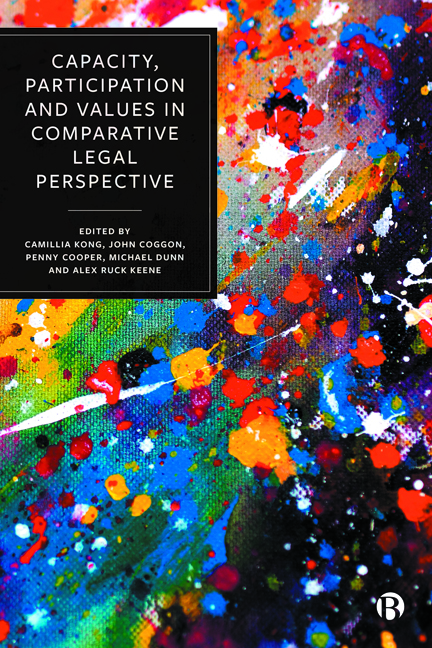Book contents
- Frontmatter
- Contents
- List of Tables and Boxes
- Notes on Contributors
- Acknowledgements
- 1 Introduction: Values, Participation and Mental Capacity Laws in International Comparative Perspective
- 2 Mental Capacity Law in England and Wales: A Value-Laden Jurisdiction
- 3 Mental Capacity Regimes Approach to Values and Participation in Proceedings Involving Individuals with Impaired Decision-Making Capacity in Scotland
- 4 The Fusion Approach to Mental Capacity Law in Northern Ireland: Possibilities and Challenges
- 5 Judging Values in a Time of Transition: An Irish Perspective
- 6 US Laws Relating to Decision-Making on Behalf of P
- 7 Indigenous Peoples with Disabilities and Canadian Mental Capacity Law
- 8 Capacity, Participation and Values in Australian Guardianship Laws
- 9 Navigating Values in Aotearoa New Zealand
- 10 Values and Participation of Individuals Without Mental Capacity in Hong Kong
- 11 Asian Values and Confucianism: How P’s Ability to Participate in Court Proceedings in Singapore Is Influenced by P’s Cultural Milieu
- 12 Respect for the Will and Preferences of People with Mental Disorders in German Law
- 13 The Place of Values and P’s Participation in Mental Capacity Law: Themes, Synergies and Tensions
- Index
3 - Mental Capacity Regimes Approach to Values and Participation in Proceedings Involving Individuals with Impaired Decision-Making Capacity in Scotland
Published online by Cambridge University Press: 18 January 2024
- Frontmatter
- Contents
- List of Tables and Boxes
- Notes on Contributors
- Acknowledgements
- 1 Introduction: Values, Participation and Mental Capacity Laws in International Comparative Perspective
- 2 Mental Capacity Law in England and Wales: A Value-Laden Jurisdiction
- 3 Mental Capacity Regimes Approach to Values and Participation in Proceedings Involving Individuals with Impaired Decision-Making Capacity in Scotland
- 4 The Fusion Approach to Mental Capacity Law in Northern Ireland: Possibilities and Challenges
- 5 Judging Values in a Time of Transition: An Irish Perspective
- 6 US Laws Relating to Decision-Making on Behalf of P
- 7 Indigenous Peoples with Disabilities and Canadian Mental Capacity Law
- 8 Capacity, Participation and Values in Australian Guardianship Laws
- 9 Navigating Values in Aotearoa New Zealand
- 10 Values and Participation of Individuals Without Mental Capacity in Hong Kong
- 11 Asian Values and Confucianism: How P’s Ability to Participate in Court Proceedings in Singapore Is Influenced by P’s Cultural Milieu
- 12 Respect for the Will and Preferences of People with Mental Disorders in German Law
- 13 The Place of Values and P’s Participation in Mental Capacity Law: Themes, Synergies and Tensions
- Index
Summary
Introduction
The Adults with Incapacity (Scotland) Act 2000 (AWIA) and Mental Health (Care and Treatment) (Scotland) Act 2003 (MHA) authorise and regulate the use of the non-consensual interventions of ‘incapable adults’, in the case of the AWIA and, in the case of civil interventions under the MHA, anyone who is deemed have ‘significantly impaired decision-making ability’ because of a ‘mental disorder’. Both Acts were originally heralded as being world-leading on the basis of their principles and rights-based approach to interventions concerning persons with mental illness, personality disorder, learning disability, dementia and other mental and physical conditions which might impair their decision-making ability (persons with mental disabilities).
The objective of the principles that underpin the operation of both Acts is to reinforce the need to respect individual autonomy wherever possible and restrict this only where necessary for the benefit of the person concerned or to avoid harm. However, since the enactment of the AWIA and MHA, international human rights law has significantly developed, largely driven by the Convention on the Rights of Persons with Disabilities (CRPD) and also, to some extent, European Convention on Human Rights (ECHR) case law. In particular, the CRPD has furthered the requirement to respect individual autonomy, emphasised that all categories of human rights apply to persons with mental disabilities and promoted a model of equality and non-discrimination that does not permit rights limitation justified by the existence of a diagnosis of mental disability or related impairment. This CRPD approach, together with perceptions of persons with lived experience of mental disability and their families that the legislation is not always meeting their needs, have called into question the continuing efficacy of the values that underpin the AWIA and MHA. This resulted in an independent review of the MHA and AWIA, and the Adult Support and Protection (Scotland) Act 2007, led by John Scott KC (the Scott Review) which reported in September 2022.
The CRPD requires that state and societal focus must be on proactively removing obstacles to achieving the capabilities of persons with mental disabilities through access to appropriate support and creation of conducive environments allowing for this.
- Type
- Chapter
- Information
- Publisher: Bristol University PressPrint publication year: 2023



